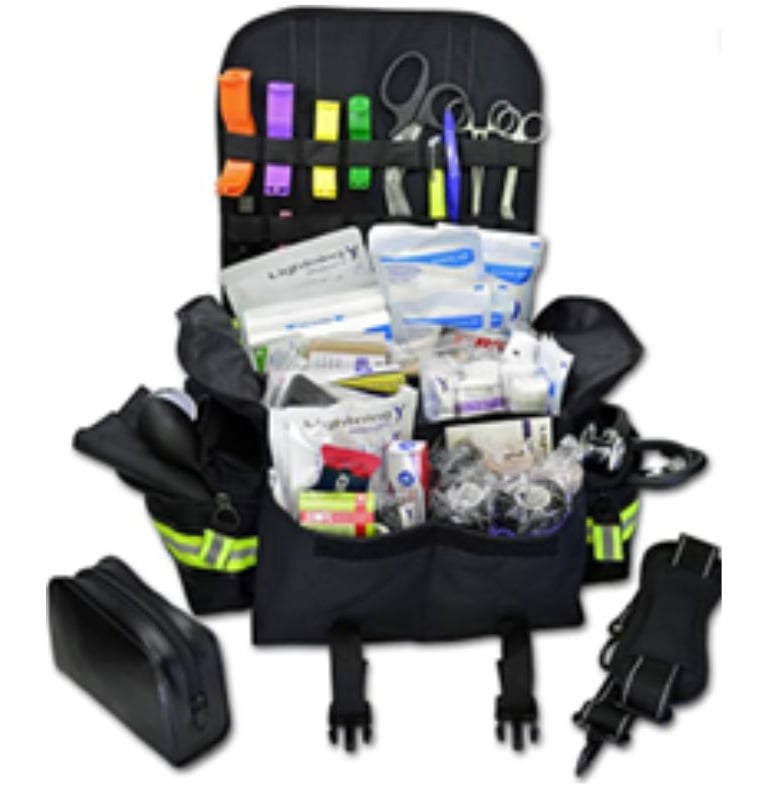Trauma Kits for Working Dogs


This post may have affiliate links. As an Amazon Associate, we earn from qualifying purchases from those links. This does not cost you anything and helps support the Sanctuary and all the animals in our care. This has no bearing on our reviews and comparisons. We will do our best to keep things fair and balanced to assist you in making the best decision for you and your animals.
Working dogs play an integral role in various industries, including law enforcement, military, search and rescue, and even agriculture. These dogs are trained to perform specific tasks and are exposed to potential hazards during their work. As such, it is crucial to have an appropriately stocked trauma kit specific to their deployment to ensure their safety and well-being in case of injuries. Some of these supplies may include gauze pads, bandages, antiseptic wipes, medical tape, splints, and other specialized equipment specific to the dog's deployment.
In the military and law enforcement, working dogs are often trained for explosive detection, patrol (bite work), and tracking. These dogs are exposed to potential injuries from gunfire, explosives, stabbings and physical attacks. Therefore, their trauma kit should contain items that can help manage severe bleeding, including tourniquets and hemostatic agents. Because they work in all seasons, there needs to be items that can help combat heat exhaustion, burns and exposure to cold. Search and rescue dogs are trained to locate missing persons in various environments, including natural disasters, collapsed buildings, and wilderness areas. These dogs may be exposed to sharp objects, cuts, and blunt trauma while searching for survivors. As such, their trauma kit should contain items that can help manage wounds, including sterile saline solution and irrigation tools. Agricultural working dogs, such as those used for herding livestock or guarding property, may also be exposed to potential injuries, including cuts and punctures from animal bites. Their trauma kit should include antiseptic solutions, wound dressings, and splints to manage injuries to the limbs.
In addition to having an appropriately stocked trauma kit, it is also essential to have a trained handler who knows how to use the supplies correctly. Handlers should receive training on basic first aid and how to use the specific supplies in the trauma kit. They should also be able to recognize signs of injury and respond promptly to provide the necessary treatment. If as a handler you do not know how to use the items in your kit - then you need to get trained!
Working dogs play a vital role in various industries and are exposed to potential injuries during their deployment. It is crucial to have an appropriately stocked trauma kit specific to their deployment to ensure their safety and well-being. These kits should contain essential supplies and equipment necessary to manage injuries specific to their work environment. Moreover, handlers should receive proper training on how to use the supplies and recognize signs of injury. By having an appropriate trauma kit and trained handlers, we can help keep working dogs healthy, safe, and performing their essential duties. Here is our favorite stocked trauma bag: Lightning X-Small First Responder EMT EMS Trauma Bag. This bag is made for humans so to outfit it for your K9 here are some suggestions: First, remove the Berman Oral Airways, Finger Splint and possibly the Blood Pressure Cuff (if a pediatric cuff is not available for your dog). Here are the first aid items that should be considered to be added - but remember you need to know how to use EVERY ITEM in your trauma kit. If you do not know how to use it, then get trained! Your attending veterinarian will be a great resource to help evaluate what you need specific to your deployment and terrain as well as how to use it. Here is a list to get you started.
First, you need the stocked trauma kit to start: Lighting S-Small First Responder EMT EMS Trauma Bag is my favorite.
Multi-tool with Wire Cutters. Leatherman has always been my favorite, but any multi-tool will do if you are on a budget, simply be sure there are wire cutters included.
Under the direction of your veterinarian, Lactated Ringers Solution (fluids) with a primary set and needles to give fluids subcutaneously. You will need a prescription for these items from your attending veterinarian if they feel it is appropriate for your dog's deployment.
EpiPen is a single dose injection of epinephrine. Talk with your attending veterinarian to see if this makes sense for your deployment. If it does, you will need to either get it through the veterinary hospital or a pharmacy with prescription.
Naloxone to reverse the effects of opioids. This is a BTC (Behind The Counter) medication. Meaning you do not need a prescription, but you will need to ask for it and give your information to the pharmacist.
Activated Charcoal. Having this on hand paired with the ASPCA Pet Poison Control number: (888) 426-4435 is an essential for all working dogs. There are several different formulations of Activated Charcoal for dogs (tablet, powder, solution, etc). Talk with your veterinarian to see which one makes the best sense for your dog's needs.
Diphenhydramine (Benadryl) Be sure that it is ONLY diphenhydramine and no other medication added like Tylenol, as that is NOT good for dogs. Your veterinarian can give you a safe first aid dose that is specific to your dog.
Adaptic Bandages. These are great for their ability to NOT stick to the wound.
Lap Sponges. These are big, super absorbent sponges that are also detectable with radiographs, so no bandages get left behind and inhibit the healing process.
Petroleum Based Ointment (like Vasoline) + Plastic Wrap (like Saran Wrap) for chest wounds to create an occlusive seal.
Sam Splint to help immobilize a broken limb or help to stabilize the spine.
Pocket sized First Aid Book & Pen Even a small blank notebook can be helpful so you can have a reference for all the normal vital values as well as to take note for any care you provide in the field, so your account the attending veterinarian is accurate.
Trauma Kits for Working Dogs
Resources and first aid essentials to help stabilize your working dog if they are injured to enable you to get to a veterinarian for help.
